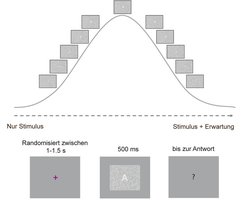Expectations speed up conscious perception
If you already know what you are about to see, you will recognise it faster

The human brain works incredibly fast. However, visual impressions are so complex that their processing takes several hundred milliseconds before they enter our consciousness. Scientists at the Max Planck Institute for Brain Research in Frankfurt am Main have now shown that this delay may vary in length. When the brain possesses some prior information ? that is, when it already knows what it is about to see ? conscious recognition occurs faster. Until now, neuroscientists assumed that the processes leading up to conscious perception were rather rigid and that their timing did not vary.
This diagram shows the experimental set-up used by Max Planck researchers to examine how the human brain processes visual information. Initially, the subjects participating in the trial had to fix a cross on a screen. Then, they were presented with an image with randomly distributed pixels (random field of noise) for a duration of 500 ms.
After that, a response screen displayed a question mark and subjects could indicate by pressing a button if they were able to recognize a symbol within the random field of noise. The same was repeated with screens, in which the hidden symbol became gradually more and more recognizable. As soon as the symbol had appeared fully and was clearly recognisable, the scientists presented the same screens in reverse order, showing each symbol fading gradually. © MPI for Brain Research
